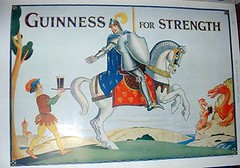I bought an old copy of Henri Gheon's Secrets of the Saints, a four-in-one volume that contains The Secret of the Cure D'Ars, The Secret of the Little Flower, The Secret of Saint Margaret Mary, and The Secret of Saint John Bosco. For $11.00, including P&H, I was pretty pleased at the prospect of it arriving.
And when it did, I discovered that there was an added bonus: An essay by Chesterton, "The Challenge of the Cure d'Ars," which was written as an epilogue to the first English edition of The Secret of the Cure d'Ars. The publishers of my newly-acquired 1954 edition said it's "too good to be omitted in this collection." I read it, and I agree. The first line alone may have been worth the entire $11.00:
"The Catholic Church is much too universal to be called international; for she is older than all the nations."
IN OCTOBER
6 years ago



